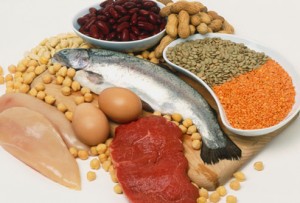Nutrition is an important aspect of gaining muscle so you should treat it as such. A proper muscle gain diet will be composed of protein, carbohydrates, and fat.
Muscle Building Foods
 Lean cuts of protein are ideal such as tuna, lean cuts of red meat, turkey, chicken breasts, egg whites, salmon ect. Don’t settle for stuff like KFC, cooking your own meals will allow you to get the best results and keep the fat to a minimum.
Lean cuts of protein are ideal such as tuna, lean cuts of red meat, turkey, chicken breasts, egg whites, salmon ect. Don’t settle for stuff like KFC, cooking your own meals will allow you to get the best results and keep the fat to a minimum.
Simple carbohydrates should be avoided for the most part, other than post workout. It’s much better to focus on whole grains, leafy greens, and foods that are a bit lower on the GI Index. Some staples of a bodybuilding diet include oats, sweet potatoes, yams, whole wheat breads and pastas, and of course fruits and veggies.
Fat is something that many people shy away from simply because it’s gotten a bad rap from people who don’t really know what they’re talking about. Fat is essential for a healthy diet, and necessary to maximize your muscle gains. Cook with extra virgin olive oil, take macadamia nut oil, take EFA (essential fatty acid) tablets, have fish at least once a week, or add an egg yolk in with your whites. These are all great ways to get in some healthy fats with your meals and help your muscle gain efforts.
Muscle Gain Diet Tips
Drink water. Carry a water bottle with you everywhere. Water helps your body flush out toxins, lubricate your joints, and help all metabolic functions take place. It’s recommended you drink 8 glasses of water a day; however, if you’re weight training or doing strenuous exercise you should take in 1-2 gallons.
Intake more calories. This is vital – you must take in more calories than you burn in order to put on weight and mass. Start with 500 more calories and if you’re not seeing results in a week bump it up.
Eat more frequently. Most people think that they’re eating enough food. This is rarely the case. If you’re not eating every 2-3 hours like clockwork then you’re probably not getting in enough food. Set an alarm to go off every 3 hours – it’s time to eat!
Up your protein. Protein is a staple in a bodybuilding and taking in a protein source every 3 hours will keep your in a positive nitrogen balance helping you stay anabolic. Start with 1 gram of protein per pound of lean body weight. If you’re carb sensitive you may want to up your protein more and lower your carbs.
Incorporate good fats. Focus on unsaturated fats. You’re bound to take in some saturated fats, however, avoid trans fats at all cost. EFA’s like fish oil caps can help you improve circulation and even increase testosterone aiding in muscle growth.
Use supplements accordingly. I don’t recommend you go out and buy out your nearest GNC, far from it. There are a few select products I recommend when bulking: whey protein / weight gainer, multivitamin, and an EFA product.
Sample Muscle Gain Diet
Meal 1:
1 cup oats, 4 egg whites + 1 whole egg, and a banana
Meal 2:
Pre-workout shake (2 scoops whey, 1 scoop maltodextrin)
Meal 3:
Post workout shake (same as pre)
Meal 4:
2 Protein pancakes (1 cup oats, 2 scoops whey, 6 egg whites, 2 whole eggs)
Meal 5:
Boneless skinless chicken breast, 2 potatoes, salad.
Meal 6:
3 cups of milk, 2 tbs peanut butter
Muscle Gain Diet Breakdown
Everybody is going to be different. What works for me might now work for you, but you can use what I use as a guide and make modifications as necessary.
The breakdown I use is 50-30-20. That is, 50% carbohydrates, 30% protein, and 20% fat. So for an individual needs 2000 calories to maintain – 3000 to gain weight you would break it down as follows:
1500 calories a day from carbs – 375 grams of carbs – 62 grams per meal
900 calories a day from protein – 225 grams of protein – 37 grams per meal
600 calories a day from fats – 66 grams of fat – 11 grams per meal
source:maxmusclemass.net
